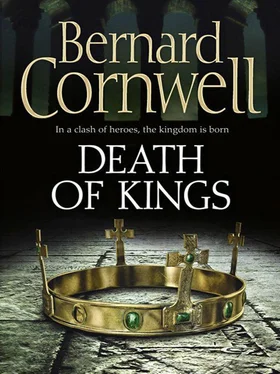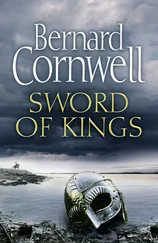‘And God’s help,’ Osferth said.
‘Even with that,’ I said, ‘and your brother knows that, and your sister knows that, and they will look for someone to lead that shield wall.’
‘You.’
‘Us. That’s why we burned Sigurd’s fleet, to show Wessex and Mercia who can lead them.’ I slapped Osferth’s shoulder and grinned at him. ‘I’m tired of being called the shield of Mercia. I want to be the sword of the Saxons.’
Alfred, if he yet lived, was dying. And I had just made his ambition my own.
We took down the eagle’s head so we would not appear hostile and, under the rising sun, slid on through England.
I had been to the land of the Danes and had seen a place of sand and thin soil and though I do not doubt that the Danes have better land than any I saw, I doubt there was any better than that through which Tyr’s Daughter made her silent voyage. The river carried us past rich fields and deep woods. The current drew the trailing willow fronds downstream. Otters twisted in the water, sinuous as they fled the shadow of our hull. Warblers were loud on the banks where the first martins gathered mud for their nests. A swan hissed at us, wings spread, and my men all hissed back and found it funny. The trees were in their new green, spreading above meadows yellowed by cowslips, while bluebells hazed the passing woods. This was what brought the Danes here, not silver, not slaves, not even reputation, but earth; deep, rich, fertile earth where crops grew and a man could raise a family without fear of starvation. Small children weeded the fields and stopped to wave at us. I saw halls and villages and herds and flocks and knew this was the real wealth that drew men across the sea.
We looked for pursuers, but saw none. We rowed, though I was reserving my men’s strength, only using a half-dozen oars on each side to keep the ship moving sleekly downriver. The mayflies were thick, and fish rose to feed, and the long weeds waved underwater and Tyr’s Daughter passed Gegnesburh and I remembered Ragnar killing the monk there. This was the town where Alfred’s wife had been raised, long before the Danes came and captured it. The town had a wall and palisade, but both were in poor repair. Much of the palisade had been torn down, presumably so men could build with the oak logs, and the earth wall had eroded into the ditch, beyond which were new houses. The Danes did not care. They felt safe here. No enemy had come in a lifetime and, as far as they were concerned, no enemy would ever come. Men called greetings to us. The only ships at Gegnesburh’s wharf were traders, wide-bellied and slow. I wondered if the town had a new Danish name. This was Mercia, yet it was being turned into a kingdom of Danes.
All day we rowed until, by evening, we were in the widening Humbre and the sea was spread before us, darkening as the sun sank behind us. We stepped the mast, a job that took all my men’s strength to achieve, and we tightened the hemp rigging on the boat’s flanks and hauled the yard and sail up. The wool and linen bellied to the south-west wind, the rigging stretched and creaked, the ship heeled and I felt the kick of the first waves, felt Tyr’s Daughter shiver to that first caress, and we manned all the oars and pulled hard, fighting an incoming tide as we ran east into the shadowing night. We needed oars and sail to keep her moving against the tide, but gradually its grip weakened and we ran into the widening sea that was white flecked in the dusk as the waves fought the river, and on we went and I saw no pursuing ships as we passed the mudbanks and felt our hull lifting to the wild sea waves.
Most ships go to the coast at dusk. The shipmaster will find a creek and stay there through the dark, but we rowed eastwards and, once the night fell, we shipped the oars and I let the little boat be driven by the wind. She ran well. I turned her southwards sometime in the darkness, then slept when the dawn came. If we were pursued I knew nothing of it, and the ships of East Anglia did not see us as we ran southwards.
I knew these waters. In the new day, under a hard bright sun, we ventured closer to the coast until I recognised a landmark. We saw two other ships, but they ignored us, and we sailed on, past the great mudflats, around Fughelness and so into the Temes. The gods loved us, the days and nights of our voyage had been undisturbed, and so we came to Lundene.
I took Tyr’s Daughter to the dock that lay beside the house I had used in Lundene. It was a house I had never thought to see again, for it was there that Gisela had died. I thought of Ælfadell and her grim prophecy that all my women would die, then consoled myself that the sorceress had not known that Sigurd’s fleet would burn, so how could she have known what would happen to my women?
I had warned my folk at Buccingahamm to expect an attack and ordered them to travel south to the safety of Lundene’s defences, and I had thought to be greeted at the house by Sigunn or even by Finan who, his decoy work done at Ceaster, was also to meet me in the city, but the house appeared empty as we pulled the last oar strokes and nosed into the dock. Men leaped ashore with mooring lines. The oars clattered as they were laid on the thwarts, and just then the house door opened and a priest came onto the terrace. ‘You can’t leave that boat here!’ he called to me.
‘Who are you?’ I asked.
‘This is a private house,’ he ignored my question. He was a lean, middle-aged man with a stern face marked by pox scars. His long black robe was spotless, woven from the finest wool. His hair was neatly trimmed. He was no ordinary priest, his clothes and demeanour both spoke of privilege. ‘There’s wharfage downstream,’ he said, pointing eastwards.
‘Who are you?’ I asked again.
‘The man telling you to find another place to put this boat,’ he said irritably, and held his stance as I pulled myself onto the wharf and confronted him. ‘I’ll have the boat removed,’ he threatened, ‘and you’ll need to pay to recover it.’
‘I’m tired,’ I said, ‘and I’m not moving the boat.’ I smelt Lundene’s familiar stench, the mix of smoke and sewage, and thought of Gisela strewing lavender on the tiled floors. The thought of her gave me the usual pang of loss and waste. She had become fond of this house that had been built by the Romans, with its rooms edging a large courtyard and its great chamber facing the river.
‘You can’t go in there!’ the priest said sternly as I walked past him, ‘it belongs to Plegmund.’
‘Plegmund?’ I asked, ‘does he command the garrison here?’ The house was given to whoever commanded Lundene’s garrison, a job that a West Saxon called Weohstan had inherited from me, but Weohstan was a friend and I knew he would welcome me beneath his roof.
‘The house was granted to the archbishop,’ the priest said, ‘by Alfred.’
‘Archbishop?’ I asked, astonished. Plegmund was the new Archbishop of Contwaraburg, a Mercian, famously pious, a friend of Alfred’s and now the evident possessor of one of Lundene’s finer houses. ‘Did a young girl come here?’ I asked. ‘Or an Irishman? A warrior?’
The priest blanched then. He must have remembered either Sigunn or Finan coming to the house, and that recollection told him who I was. ‘You’re Uhtred?’ he asked.
‘I’m Uhtred,’ I said and pushed the house door open. The long room, which had been so welcoming when Gisela lived here, was now a place where monks copied manuscripts. There were six tall desks on which ink pots, quills and parchments lay. Two of the desks were occupied by clerks. One was writing, copying a manuscript, while the other was using a ruler and a needle to prick lines on an empty parchment. The pricked lines were a guide to keep the writing straight. The two men glanced at me nervously, then went back to their copying. ‘So did a girl come here?’ I asked the priest. ‘A Danish girl. Slight and pretty. She’d have had a half-dozen warriors escorting her.’
Читать дальше
Конец ознакомительного отрывка
Купить книгу












